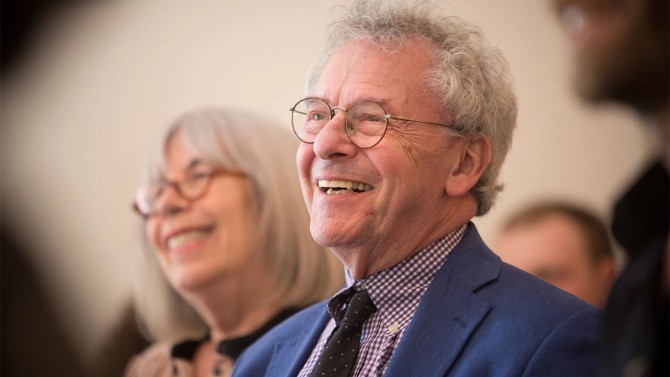Professor’s posthumous memoir details turbulent childhood
By Joe Wilensky
A new posthumous memoir by Isaac Kramnick, the renowned scholar of political thought and history who served on the Cornell faculty for 45 years, traces his life from birth into an unstable family and years in the child welfare system to his undergraduate days at Harvard University.
“I never felt burdened by the hell that was my early life, or if I did, I repressed it,” Kramnick wrote in the book, “Foster Child: A Midcentury Jewish American Boyhood.” “Repression and denial, when they work, can be effective coping mechanisms, the backbone of resiliency.”
The memoir was unpublished when Kramnick died in December 2019 at age 81.
With the blessing of Kramnick’s family, Ross Brann, the Milton R. Konvitz Professor of Judeo-Islamic Studies in the College of Arts and Sciences, pitched the book as part of his department’s “occasional publications” series, served as its editor, and contracted with Penn State Press to print it.
“Foster Child” is framed by Kramnick’s investigations, beginning at age 40, into his past – including his biological parents’ struggles, siblings he’d never known, and his several placements within the foster-care system.
After his parents were unable to care for him, he was ultimately raised in rural Massachusetts by an Orthodox Jewish farming family and attended Harvard on a scholarship.
Brann calls publishing the memoir “a labor of love” – a way of keeping Kramnick’s memory alive. “Isaac was a mentor,” Brann said, “and, even more, he became my ideal of the kind of Cornell professor I wanted to try to be.”
Kramnick, the Richard J. Schwartz Professor of Government Emeritus (A&S), also helped create the West Campus house system and its faculty-in-residence programming.
He later became a de facto Cornell historian, co-authoring “Cornell: A History, 1940–2015” with colleague Glenn Altschuler, Ph.D. ’76, and helping plan the university’s Sesquicentennial celebration. In 2022, a scholarship for first-generation students was established in his name
Kramnick’s biological mother, Sarah, struggled with mental health issues, and at the time he was born in 1938, she was in a psychiatric hospital. His father, Max, could not afford to raise him.
At one month old, Kramnick became a ward of the state. He writes that he has no memory of his first three foster mothers and therefore “no memories of being with them or taken from them, which means I did not consciously brood over any hurt from serial abandonments.”
But at five, he was placed with the Spiro family in Millis, a small town southwest of Boston.
“I hit the foster care jackpot, a permanent placement that would take me to young adulthood,” he writes. “My fourth foster home was the ‘good Jewish home’ that succeeded far more than the well-intentioned but weary social workers of the Commonwealth of Massachusetts could ever have imagined.”
While the Spiros showed little affection and demanded strict adherence to household rules and religious norms, he wrote, they offered stability and set him up for success; his foster mother, Helen, was fiercely devoted to his welfare.
Kramnick also describes his story as a particularly Jewish one; the memoir includes many Yiddish terms and particular details and traditions of 1940s and ’50s Jewish life.
While he wasn’t observant as an adult, Kramnick remained culturally Jewish.
His childhood, he writes, “is a story about one of the millions of families who made the monumental move from the old country to an America whose streets would not be paved with gold.”
After earning his undergrad degree summa cum laude, Kramnick studied at the University of Cambridge in the U.K., then returned to Harvard for his doctorate. He taught at several elite universities before coming to Cornell in 1972.
“It’s such a story of resilience,” Brann said. “This young boy, who really had a hard life, nevertheless managed to escape those burdens and succeed – remarkably so.”
Media Contact
Get Cornell news delivered right to your inbox.
Subscribe

